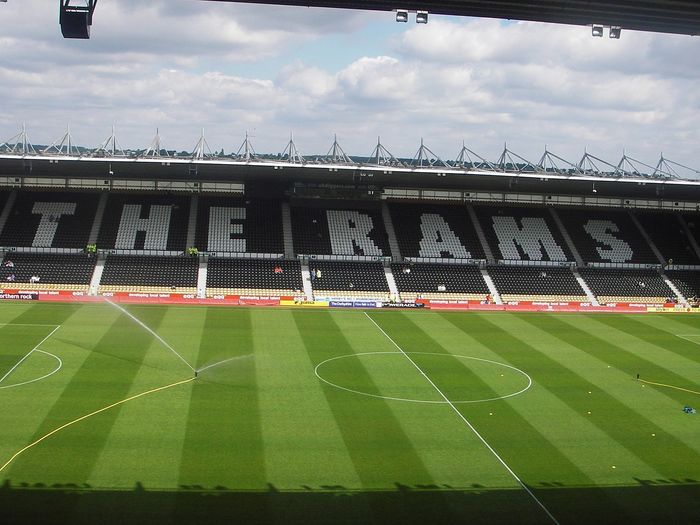The EFL is a financial mess: it should look to Spain for inspiration
In the wake of Derby County’s relegation last Monday (18/4), Deputy Sport Editor Tom Bullivant criticises the English Football League’s financial structure and argues in favour of Europe adopting Spain’s tighter rules on spending

Last Monday (18/4) saw Derby County relegated to the third tier of English football for the first time since 1986. Derby find themselves in this predicament thanks to years of trying to cheat the system with poor financial management at the hands of ex-owner Mel Morris. Everybody knows that. Everybody also knows that, in a few years time, there will be another club like Derby County, and a few years later another.
Spending in the English Football League (EFL), particularly the Championship, is by and large recklessly unsustainable and is just getting worse. Clubs are risking it all for the windfall moment of reaching the Premier League and, when only three of 24 teams make the top flight each season, there are inevitable losers.
Derby are the latest in a line of teams that includes Sheffield Wednesday and Wigan to have faced financial ruin. With overspending and running on losses becoming a common occurrence in the EFL, with the Premier League and France’s Ligue 1 starting to be dominated by state-backed, mega-spending clubs, and teams in Italian divisions regularly folding over the past 20-30 years, many footballing leagues should be looking for an example of how to operate sustainably. They should be looking towards Spain.
“[Spain’s] rules also prevent uber-wealthy owners pumping money into clubs from their own pockets, stopping state-backed clubs like the Man Citys or PSGs from dominating”
La Liga’s Financial Fair Play rules, which cover Spain’s top two divisions, are far stricter and more effective than those ‘imposed’ by UEFA and many domestic leagues. A brief summary: in Spain, the league sets each team a different squad-cost limit, limiting the money spent both on transfers and staff wages, including non-playing staff. This is set before the summer transfer window in order to prevent any unsustainable or anti-competitive spending before it can even take place, unlike in the rest of Europe. This limit is calculated looking at a range of factors, from clubs’ prospective earnings, to past profits and losses, overheads, earnings, investments, and savings. The league employs a number of accountants to draw these up, and when a club signs a player and attempts to register them with the league’s ‘La Liga Manager’ software, the signing must be first deemed economically viable by the league before they can be registered.
Barcelona’s debacle in their failure to register players last year was a good example of the league putting these rules into practice, enforcing responsible spending. What’s more, the rules also prevent uber-wealthy owners pumping money into clubs from their own pockets, stopping state-backed clubs like the Man Citys or PSGs from dominating. In addition, this prevents any risk of clubs folding if the owners suddenly decide to sell up. It is a fundamentally sustainable model.
These rules were implemented in 2013 after a pattern that could easily emerge in the English Championship. In the five years before the rule change, more than 20 teams had experienced financial difficulties and the very structure of the Spanish football pyramid was in jeopardy. Players went on strike and some of Spain’s biggest clubs, Real Betis, Valencia CF, Deportivo de La Coruña, and Racing Santander to name a few, were in serious danger of disappearing. But the new rules were soon put into effect and Spanish football is far, far healthier today as a result.
“In other countries, financial doping is widespread and unsustainable. UEFA’s FFP rules fall woefully short of requirements”
Since 2013, no clubs have ceased to exist, no players have gone on strike, and there have been no Spanish Derby Countys. Admittedly, some clubs have faced financial difficulties. Malaga is a notable example, but their old owner was largely to blame after racking up plenty of debt pre-2013. Still, they remain in Spain’s second division, in contention to return to the top. Clearly, this level of financial instability is on a scale far smaller than in other European leagues.
What’s more, these rules have made the quality of Spanish football better and the league a more attractive investment opportunity. There is obviously irony in calling Spanish football competitive when Barcelona and Real Madrid have won in 60 of the league’s 90 years of existence, but there is real truth to the statement. The rules have only been in place for nine years, so the smaller teams have had little opportunity to implement business models capable of dethroning the grand old men of Spanish football, but there has been change nevertheless.
Granted, Spanish football is not perfect, but many of its faults are not a consequence of its enhanced FFP. Even still, the league’s rules have come under criticism, particularly last summer when Barcelona were unable to register several players and ultimately Lionel Messi left for PSG. Yet these criticisms were misdirected. Spanish FFP rules in fact saved Barcelona from running up even higher losses and encountering far bigger problems down the line. It was Barcelona’s crazy wages and transfer fees and lack of foresight that saw Messi leave, not La Liga.
You may wish to blame last April’s European Super League stunt, when Atlético Madrid, Barcelona, and Real Madrid faced the chance of injecting unlimited money into their teams, on the spending restrictions. But don’t. Instead, blame the arrogant and out of touch leaders of the clubs who were seduced by bankers selling them a dream. Spanish FFP acts to block exactly this happening, creating a level playing field and supporting the footballing ecosystem these clubs tried to shaft.
Other leagues must adopt similar measures to Spain in order to curb the growing exodus of historic clubs from the top divisions to the pyramid’s lower levels. In Italy, it is a given that, after most seasons, one or two sides will cease to exist, or will be relegated to third-division Serie C thanks to money trouble. In other countries, financial doping is widespread and unsustainable. UEFA’s FFP rules fall woefully short of requirements. When you punish a club after it has broken spending rules with a fine, the fine is just tax on the overspend and an insufficient deterrent for clubs with deep pockets like Man City and PSG.
What about Derby then, England’s latest fatality of financial hardship? Derby are simply victims of the culture they contribute to. With no rule changes in the EFL, or at least stricter implementation of the rules that exist, more and more clubs will run at losses trying to reach the Premier League, and more will face financial ruin. The Championship is sometimes described as the most unpredictable league in the world. Maybe its members should shock us yet again and follow in the footsteps of La Liga.
 News / Deborah Prentice overtaken as highest-paid Russell Group VC2 February 2026
News / Deborah Prentice overtaken as highest-paid Russell Group VC2 February 2026 Fashion / A guide to Cambridge’s second-hand scene2 February 2026
Fashion / A guide to Cambridge’s second-hand scene2 February 2026 News / Christ’s announces toned-down ‘soirée’ in place of May Ball3 February 2026
News / Christ’s announces toned-down ‘soirée’ in place of May Ball3 February 2026 News / Downing Bar dodges college takeover31 January 2026
News / Downing Bar dodges college takeover31 January 2026 Comment / College rivalry should not become college snobbery30 January 2026
Comment / College rivalry should not become college snobbery30 January 2026










